Hunter x Hunter & Dragon Ball Z: the Fall of the Shounen Hero
by ZeroReq011,SPOILER WARNING: The following article contains major spoilers for the 2011 Hunter × Hunter anime
It probably wouldn't be a stretch to say the most iconic face of the shounen manga battle genre would be Son Goku from Dragon Ball. Goku works to be the strongest in every arc, training especially hard when the next toughest villain appears. He's also a pretty good-natured and down-to-earth guy. Honestly, he's not unlike Superman in those respects. I suppose it's little wonder then that online nerd forums periodically pit Goku and Superman in one clash or another: who's stronger, who's better.
I'm not interested in arguing who'd beat up who, nor do I want to argue who's better written. All I'm saying is… if there's one thing that Goku has that prototypical not-Snyder Superman doesn't… it's an obsession with fighting strong opponents. He likes it too much, to the point that it affects his other priorities. Despite this issue, Goku is such an iconic face in shounen battlers that he's influenced so many MCs in the genre since, fragments of his personality reborn into new faces, good and bad. In Gon Freecss from Yoshihiro Togashi's Hunter x Hunter (henceforth HxH), we see a more biting exploration of the bad: that self-centeredness that Goku embodies.

It is in HxH's exploration of this self-centeredness that the series takes the shounen battler to new heights, and it achieves this by giving us a flawed hero, one that physically, mentally, and emotionally succumbs to their worst impulses.
Goku Wants to Fight Strong Guys
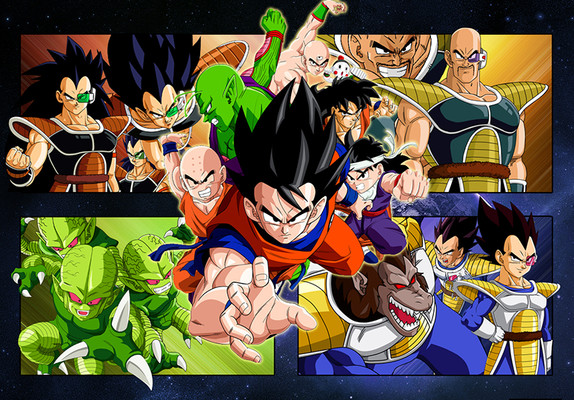
“Saving the day” and “growth through challenge” have previously featured in shounen battlers in more or less mutual benefit—one encourages the other— but that harmony isn't always or even naturally the case for the genre. Dragon Ball and HxH's stories feature both themes in conflict with each other.
To return to Superman v. Goku, in her analysis of Superman's core character, Red from Overly Sarcastic Productions summarizes the OG Man of Steel as someone who “is capable of godlike feats of strength and power,” but “spends his days saving humans and trying to make the world a better place.” By contrast, Dragon Ball creator Akira Toriyama describes the OG Super Saiyan of Legend as someone who doesn't “fight for the sake of others” but “wants to fight against strong guys.” It's a self-absorbed trait that's more obvious in manga Goku, but still echoes in his anime version.
Goku tends to spare the lives of the villains he beats, and not for the reasons you'd expect. He admittedly has a distaste for killing people, but before we get lost in yet another argument of why the Batman doesn't just kill the Joker, there's another reason for why he gives villains second chances or more: he just wants to fight them again, and he'll overlook their past villainy for it. This desire is related to another troublesome quirk of his that crops up whenever he faces genocidal foes: he wants to fight them at their strongest.
One clear example of Goku acting on his impulses is at the end of his first fight with Vegeta in Dragon Ball Z. After his unsuccessful attempt at destroying Earth, Vegeta is ultimately beaten and broken, though Goku's allies and friends gave up their lives in the process. A surviving friend, Krillin, picks up a sword. He is about to finish off Vegeta, but then Goku stops him.
He urges him to let Vegeta escape, despite Vegeta swearing he'll return after he's healed up to destroy everything. Goku in the English dub for the original DBZ anime tells Krillin that Earth's defenders have to be the better men, and that they should give Vegeta a chance to reform and a model to inspire reform from (like with Piccolo).


The original Japanese script, though, has Goku saying something more like: "I know it's selfish, but I want to fight Vegeta again, so despite the potential risk, can you let him go for me, Krillin?" Krillin agrees, not because he fully believes Vegeta can be redeemed, but because he (maybe naïvely) trusts Goku can beat Vegeta again if worse comes to worst. In that arc, at least, the story doesn't challenge Goku's self-absorbed decision-making.


I stress at least, as DBZ does treat Goku more critically in later arcs (arcs where he can't defeat the latest villains by himself and he's often meme'd as a bad dad by the fanbase), but Dragon Ball rarely forces Goku into having to deal with lasting traumatizing consequences for his more selfish actions. Yeah, there are wish-granting Dragon Balls to revive his fallen friends in the end, and sure, he'll take the energy bullet in everyone's place if it comes down to it. Goku, himself, doesn't fear dying.
But what if there was no well-established way to bring back the dead? And what if a loved one is killed in your place?
Gon Is One Really Crazy Kid

So from Goku and Superman, we finally come down to Gon from HxH, who suffers from an even worse case of selfish-Goku-syndrome. Gon and Goku operate on similar wavelengths: they are both friendly and earnest guys who tackle greater and tougher challenges to get stronger. They also tend to spare and even come to like people who are just terrible and godawful if they've been useful to them, especially if it helps them become stronger.
Now, Gon being like Goku isn't necessarily a bad thing all the time, because Goku's character makes up the DNA of shounen heroes, the spirit of what's inspiring about them. If Gon weren't a straightforwardly-minded kid, Killua Zoldyck wouldn't have become his best friend. And if Gon wasn't his friend, Killua wouldn't have been able to escape his abusive family and his fate of being yet another remorseless assassin murderer.
However, Gon's individual, single-minded determination towards achieving what he wants can encompass far more than the friends he wants to keep—at one point, it comes at the expense of a friend. When first writing Gon, Togashi imagined him as “a good boy,” but he changed his mind, later calling Gon “one really crazy kid.” After all, could you really call a boy who would abandon his foster mother for the adventurous Hunter life (funnily enough, emulating his father who also abandoned him for the same reason) a completely good boy? More like a kid with issues, not unlike his friend Killua.
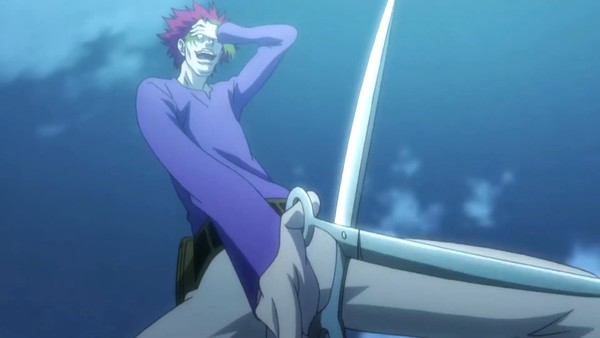
So yeah, even before getting to Kite, Gon already has a few screws loose. Yet in some ways Gon is even more extreme than Goku: in the Greed Island arc, Gon and Killua are tasked by their mentor to train with Binolt, a serial killer who preys on young women and is also a cannibal. Binolt spends that training period intent on brutally murdering them both, and when the boys eventually defeat him, Gon spares his life and convinces Killua to as well, because regardless of what heinous crimes he's committed until now, Gon's grateful he helped them get stronger.
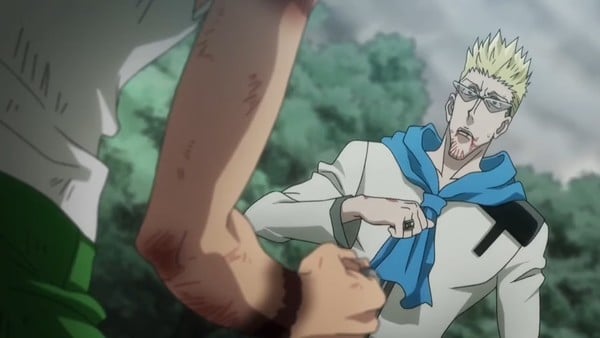
Another outrageous thing Gon does in the same arc is get his arm blown off. Gon faces off against Genthru, a serial bomber with a habit of backstab-blasting people. To secure an opening for a clean hit on him, Gon opens his arms up to Genthru's attacks. It results in one arm being charred and the other becoming a blackened stump. Nevertheless, Gon grits his teeth through the excruciating pain and turns his head to face him, grinning, which freaks Genthru out. From other scenes but especially these two, we learn, concretely, two disturbing things about Gon: (1) he will overlook questionable stuff when he's self-absorbed by something, and (2) he will go to ridiculously extreme lengths to achieve his aims.
The Flawed Shounen Hero Finally Falls
HxH is a fairly long series, and up to the Greed Island arc, Gon has succeeded at most of what he puts his mind to. He's been able to throw himself into all manner of dangerous situations without serious permanent damage, and come out stronger for it. Even when Gon's all battered up and missing half an arm in Greed Island, the arc concludes with a literal card being pulled and all his injuries healing up, including his lost limb, because of the convenient story magic of Greed Island being a game world. It's similar to Goku and his quest for the Dragon Balls. The heroes get off easy. The status quo is reestablished. It's safe again.
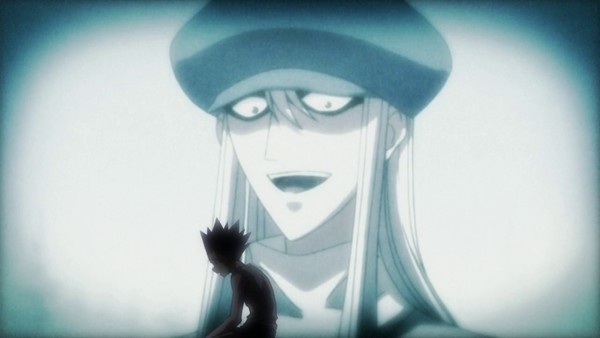
That tidiness ends in the following Chimera Ant arc, where Gon loses Kite. Like Shanks is to Luffy in One Piece, Kite—his father's protégé—becomes the closest thing Gon has to a proper father figure. Kite is the first person who really introduces Gon to the world of Hunters, setting him on the path to become a titular Hunter and “hunt” after the legendary Hunter, his shitty father.
Gon and Killua encounter Kite while he's out on a hunt for the dangerous Chimera Ants. Gon asks if the two of them can tag along, and Kite agrees. Like the forests they enter, the party embroil themselves deeper into the issue, doing well against the Chimera Ants that stand in their way… until they meet a special one, Neferpitou (or just Pitou).
The arc devolves further from the game that preceded it, as Kite realizes that all of them are way over their heads in what they can handle. Kite loses an arm trying to protect the boys from the overwhelming danger. This sets Gon into a rage, but before anything comes of it, an unnerved Killua knocks Gon out cold and gets them both out of there on Kite's orders.
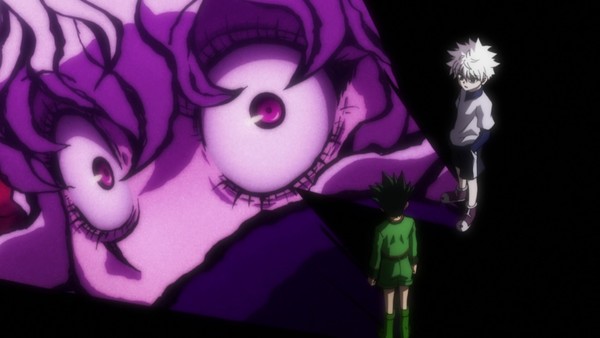
Other subplots animate the Chimera Ant arc after this scene, including one that involves “saving the day.” By this point, the Chimera Ant threat has evolved to them subjugating and consuming all of humanity. For Gon, though, the only things that matter to him now are saving Kite and getting revenge. He believes, with all his naïve heart, that Kite's still alive. He has to; Kite said as much. In his obsession with Kite, Gon gradually loses perspective of everything and everyone around him, including Killua. His ever more myopic mind is resentful of Killua for abandoning Kite and not getting proper revenge against Pitou.
Gon and Killua join a new team to exterminate the Chimera Ants and protect humanity, but that outcome is incidental for Gon, a means to an end for him. Through it, he reencounters a vulnerable Pitou trying to save an innocent human life on her king's orders. He demands that Pitou save Kite now lest he kills both the Chimera Ant and the human girl. Pitou and Killua just barely convince Gon to relent until they heal the girl. Killua stresses that Kite can't possibly be saved if Pitou's prematurely dead, and Pitou won't honor that demand until she heals the girl first. Also, what the hell Gon…
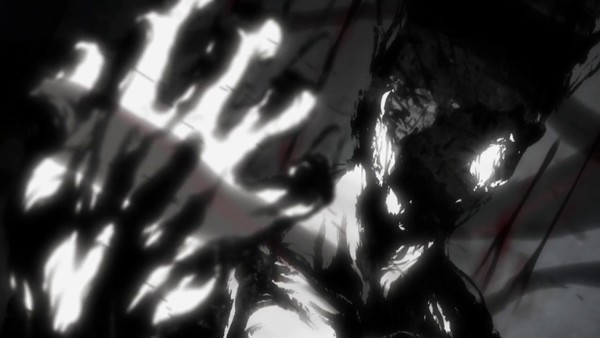
…what a tragedy, Gon's. The girl is saved, but Kite isn't. He can't be. Pitou killed him already, so there's no way. The revelation that he pinned everything on a false hope leaves Gon with only one goal left he could possibly realize: revenge. But Pitou is an outrageously tough opponent. In a morbid twist to “growth through challenge,” Gon basically offers his life force and potential development as a fighter to age up and beat Pitou.

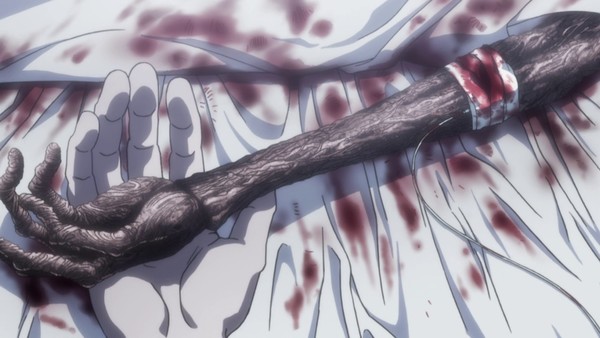
And then he beat Pitou—thoroughly, just thrashed them. There isn't a corpse left after he's done with them. And then his body shrivels up. He's a corpse whose heart somehow still ticks.
The Fallen Hero is Picked Back Up by a Friend
In writing Gon this way, Togashi wanted to be “able to write battles without having moral conflicts within the character,” which matches what Goku is like, roughly speaking. But more than Toriyama with Goku, Togashi takes this lack of self-reflection and tendency towards self-absorption to its extreme with Gon. Gon pushes Killua away despite his sincere concern for him. He threatens to kill an innocent person when he doesn't get what he wants right away. He trades his life and future for instant, overwhelming power, not so he can use it for some noble aim like “saving the day,” but to spite the face of someone who did him wrong until it's turned into undefinable smears of gore on tree bark.

But Togashi isn't condemning the shounen hero by making Gon in HxH flawed like this. To Killua, Gon is the one who saved him from a future of darkness. He calls Gon his light, because Gon, flaws and all, reached out to him and befriended him. Gon's spurning of Killua during the Chimera Ant arc shakes Killua to tears, but it doesn't stop him from doing everything he can to restore his best friend back to health. He even confronts his family again, the source of his darkness. Through Killua's own sacrifices, this time actually for the sake of another, Gon is made healthy again, albeit without much of his prior fighting abilities.
Taking Goku as the heroic standard, the most obvious model protagonist, Gon, makes a terrible fall from grace, while a less likely edgy figure, Killua, ends up becoming more of the protagonist that fans of the genre probably expect.
Through Gon, a deliberately flawed protagonist who he adores to write but is also deeply critical of and willing to tear apart to teach a lesson, Togashi builds upon the hero that he, Toriyama, and other shounen manga writers have created and popularized. And in doing so, he has created a work that is both respectful of its roots and unlike anything the genre has ever seen before.
Social Scientist & History Buff. Dabbles in Creative Writing & Anime Criticism. Consider following him at @zeroreq011
discuss this in the forum (19 posts) |